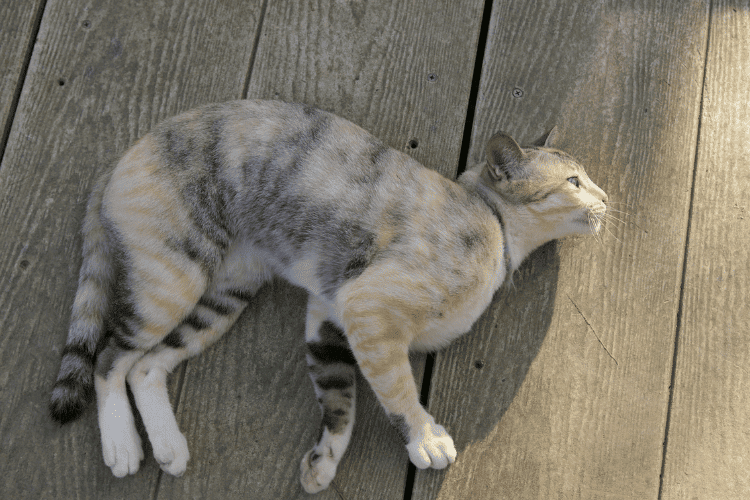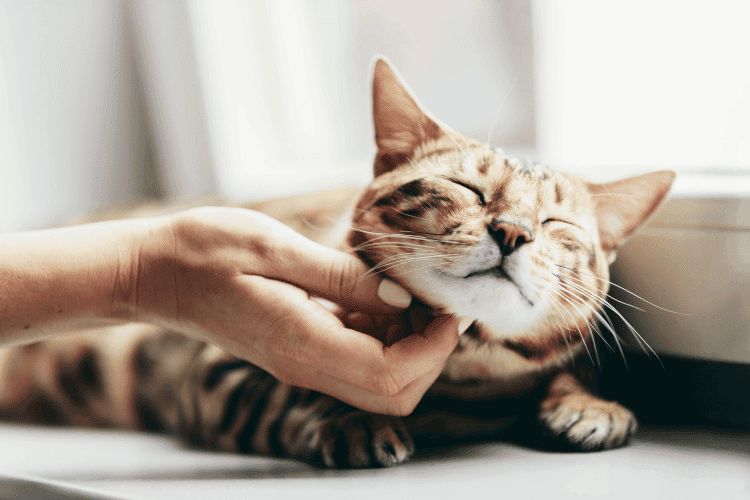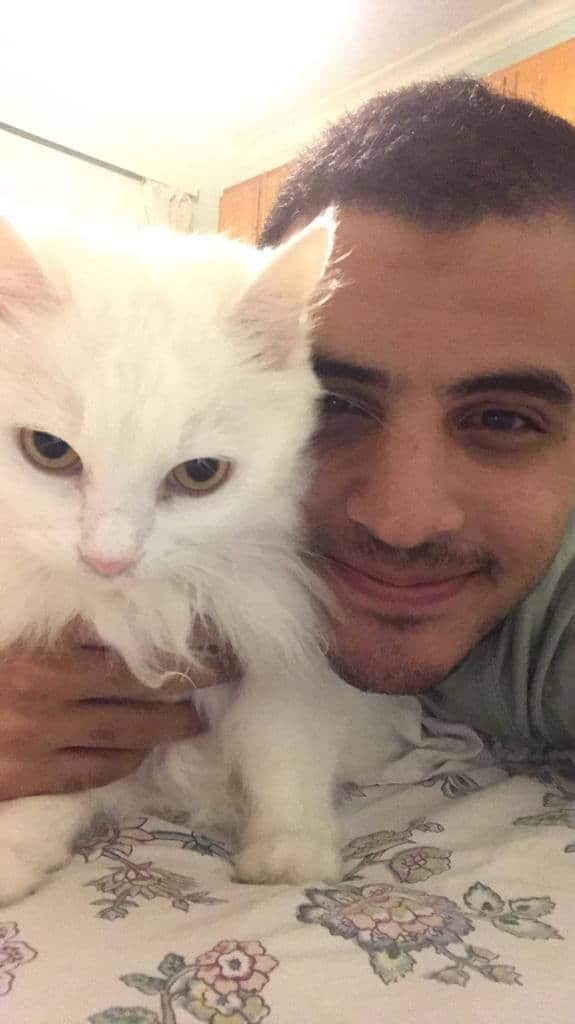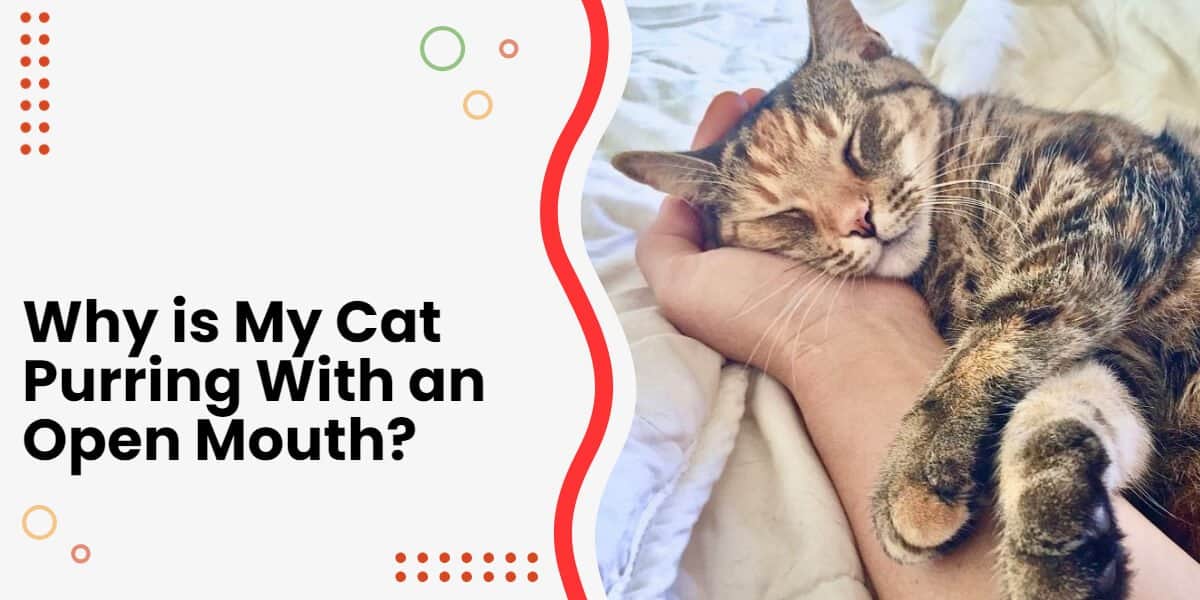As cat owners, we’ve all experienced those heartwarming moments when our furry companions curl up beside us, emitting that gentle, rhythmic purring sound that seems to emanate from the depths of their contentment.
What happens when this familiar melody comes with a surprising twist, though? What if it comes with an open mouth?
In the world of feline communication, every purr, twitch, and meow holds a message waiting to be deciphered. As dedicated caregivers, it’s natural to feel a twinge of worry when our beloved pets exhibit behaviors we’re not accustomed to seeing.
The purpose of this article is to unravel the mystery behind your cat purring with its mouth open, shedding light on the reasons behind this behavior and offering insight to put any apprehensions to rest. Stick around!
Table of Contents
Is Purring With an Open Mouth Normal?
As a cat owner, you’re likely attuned to your pet’s various behaviors and quirks.
However, there are instances when your cat might exhibit a behavior that leaves you puzzled, like purring with an open mouth.
While it might seem unusual, this behavior can have various explanations, some of which are perfectly normal and harmless, while others are a cause for concern.
Contentment and Relaxation
In many cases, a cat purring with an open mouth is simply a sign of extreme contentment and relaxation. Just like when a cat purrs with its mouth closed, the open-mouthed purring can indicate that your cat is feeling comfortable and at ease.
The open mouth might be due to the cat’s state of relaxation causing its jaw muscles to relax as well. In such instances, there’s generally no cause for concern.
Heat Dissipation
Cats sweat much less than humans do, and they rely on other mechanisms to regulate their body temperature. One of these mechanisms involves panting or breathing with an open mouth.
If your cat has been playing vigorously or is in a warm environment, it might start to pant, which can be accompanied by purring. This combination of behaviors helps the cat release excess heat and cool down.
However, if your cat seems to be panting excessively, it’s advisable to consult a veterinarian, as it could be a sign of overheating or an underlying health issue.
Related: Why does my cat gag when purring?
Stress or Overstimulation

While purring generally indicates contentment, there are cases where an open-mouthed purr might indicate stress or overstimulation.
Some cats might respond to overwhelming situations by displaying this behavior. If your cat is in an unfamiliar environment, surrounded by loud noises, or encountering new people or animals, the open-mouthed purring could be a sign of anxiety.
In such cases, it’s essential to create a calm and safe space for your cat to help alleviate its stress.
Dental Issues
Occasionally, open-mouthed purring might be related to dental discomfort. Cats might purr while breathing through an open mouth if they have dental problems, gum irritation, or tooth pain.
If you notice any other signs of oral discomfort, such as excessive drooling, bad breath, or reluctance to eat, it’s wise to consult a veterinarian to rule out any dental issues.
Disease or Illness
If none of the above-mentioned reasons seem to be the case with your cat, then it’s likely that your cat is ill or has some sort of disease.
Illnesses and diseases that can be attributed to purring with an open mouth include:
- Cardiac disease
- Lung and respiratory issues
- Eustachian tube dysfunction (connecting the middle ear and back of the nose)
- Chronic renal failure
- Hypertrophic cardiomyopathy (enlarged heart with thickened walls)
- Throat inflammation
- Nasopharyngeal polyps (benign masses in the middle ear)
- Pain
Note that senior cats are more susceptible to these aforementioned conditions than younger cats.
What Should I Do If My Cat Is Purring With an Open Mouth?
Encountering your cat purring with an open mouth can evoke a mix of curiosity and concern. While this behavior can be normal in certain situations, it’s important to assess the context and your cat’s overall well-being.
Here’s what you should consider doing when you see your cat purring with an open mouth:
Observe the Surroundings
Take a moment to assess your cat’s environment. Is the room particularly warm? Has your cat been engaged in vigorous play or exercise?
Environmental factors can play a significant role in causing a cat to pant or breathe with an open mouth.
If the room temperature is high or your cat has been active, it might be a natural response to regulate body temperature.
Check for Signs of Discomfort
Carefully observe your cat’s body language and behavior. Are there any signs of distress, anxiety, or discomfort?
If your cat’s open-mouthed purring is accompanied by other unusual behaviors such as hiding, pacing, or excessive drooling, it could indicate stress or an underlying health issue.

Consider Dental Health
If you suspect that dental discomfort might be contributing to your cat’s behavior, it’s advisable to gently examine your cat’s mouth, if possible.
Look for any signs of redness, swelling, or inflammation in the gums or mouth. If you notice any abnormalities, consult a veterinarian to address potential dental issues.
Monitor Frequency and Duration
Pay attention to how often your cat exhibits open-mouthed purring and how long the behavior persists. Occasional instances in appropriate contexts might not be a cause for concern.
However, if the behavior becomes frequent or prolonged, it’s best to consult a veterinarian for a thorough evaluation.
Related: Why Is My Cat Making Weird Mouth Movements?
Provide a Calming Environment
If your cat’s behavior seems to be linked to stress or anxiety, create a soothing and safe environment.
Ensure that your cat has a quiet space to retreat to, away from any potential stressors. Provide familiar toys, comfortable bedding, and gentle interactions to help alleviate any anxiety.
Consult a Veterinarian
If you’re unsure about the cause of your cat’s open-mouthed purring or if you notice any changes in behavior, appetite, or overall health, it’s recommended to consult a veterinarian.
A professional assessment can help identify any underlying issues and provide appropriate guidance or treatment.
The Science Behind Purring
You know that comforting rumble your cat makes? It’s not just a happy noise! Your cat’s purring serves a wide range of purposes, including:
Communication and Bonding
One of the primary reasons cats purr is to communicate with their owners and fellow felines. Mother cats, for instance, purr while nursing their kittens, creating a calming atmosphere and establishing a strong bond.
As kittens grow, they learn to purr as a way to signal contentment and security. This communication tool extends to their human companions, as cats often purr when they feel safe and close to their owners.
Self-Healing Mechanism
Interestingly, purring is not only a means of emotional expression but also a self-soothing mechanism for cats. It’s been suggested that the low-frequency vibrations produced during purring have a therapeutic effect on a cat’s body.
Purring is believed to stimulate the release of endorphins, which are natural painkillers, allowing cats to manage discomfort and heal more effectively. This might explain why cats often purr when they are injured or unwell.
Stress Reduction
Cats are known for their sensitive nature, and they can easily become stressed or anxious in unfamiliar or challenging situations. Purring can serve as a coping mechanism to alleviate stress.
By purring, cats can calm themselves down and regulate their emotions. This behavior is particularly evident when a cat is exposed to new environments or experiences, or even when visiting the veterinarian.
Territory and Communication
In addition to its role in interpersonal relationships, purring also has a function in cat-to-cat communication. Purring can signal a sense of security within a cat’s territory.
For instance, when a cat purrs while lying in a particular spot, it may be marking that area as its own and sending a signal to other cats that it’s a safe and friendly space.
Related: Cat Sounds Congested When Purring
Reproduction and Mating
Purring can also play a role in reproduction and mating. Female cats in heat often purr to attract potential mates, and male cats may use purring as a means of courting females.
This form of communication is vital for ensuring the continuation of the species and maintaining social bonds within feral cat populations.
Wrapping Up
Understanding the world of feline behavior is an ongoing journey, and the phenomenon of a cat purring with an open mouth is just one captivating aspect.
Whether it’s a contented display of relaxation, a method of cooling down, a response to stress, or an underlying condition, a cat’s open-mouthed purring is to be observed.
By being attuned to your cat’s cues, seeking to comprehend her behaviors, and responding with care, you can ensure her comfort, health, and happiness.
Remember, while open-mouthed purring might occasionally raise questions, it’s yet another reminder of the multifaceted world of cats; a world we are privileged to share and explore alongside our endearing furry friends.

I’ve been living with cats since 2008 and I can confidently say I have more feline friends than humans lol. I currently live with 5 cats in different life stages; two of them are less than one year old, one is 2-ish years old and the oldest two are 9-ish years old. I’ve developed a strong bond with cats over the years and I’m eager to share my experience through this blog. You can learn more about my cats here.

